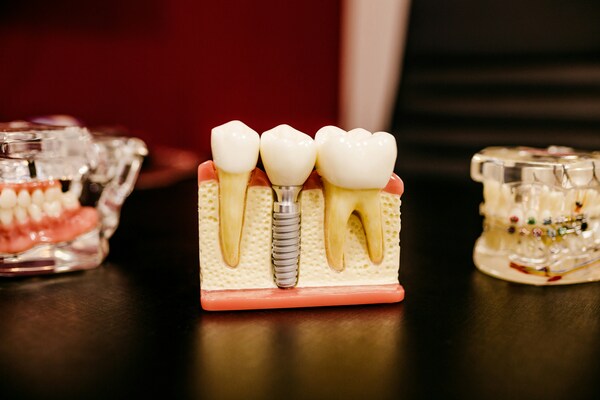Introduction
Finding the best dental implants near me can be a daunting task, but with the right information, you can make an informed decision that will improve your dental health and confidence. Dental implants are a popular and effective solution for replacing missing teeth, offering a permanent, natural-looking alternative to dentures and bridges. In this comprehensive guide, we'll explore everything you need to know about dental implants, including their benefits, types, costs, and how to find the best providers near you.
What Are Dental Implants?
Dental implants are synthetic tooth roots constructed from biocompatible materials, usually titanium, and are surgically inserted into the jawbone. They provide a strong foundation for fixed or removable replacement teeth, which are designed to match your natural teeth. Implants fuse with the jawbone through a process called osseointegration, ensuring a stable and durable support for the artificial teeth.
Benefits of Dental Implants
Dental implants provide several benefits compared to other tooth replacement methods:
- Improved Appearance: Dental implants resemble and feel just like your natural teeth.
- Enhanced Comfort: Since they become a part of you, implants eliminate the discomfort of removable dentures.
- Better Oral Health: Unlike a tooth-supported bridge, implants do not necessitate reducing adjacent teeth. This improves long-term oral health.
- Durability: Implants are very durable and can last many years, with proper care, they can last a lifetime.
- Convenience: Implants eliminate the inconvenience of removing dentures and the need for messy adhesives to keep them in place.
Types of Dental Implants
There are several types of dental implants available, each suited to different needs and situations. Grasping the distinctions can assist you in selecting the optimal choice for your circumstances.
Traditional Dental Implants
Traditional dental implants are the most common type. They consist of a titanium post implanted into the jawbone, an abutment, and a crown. This type typically requires several months for the complete process, including healing and bone integration.
Mini Dental Implants
Mini dental implants are smaller in diameter than traditional implants and are used primarily for patients with less available bone structure. They often require less invasive surgery and a shorter recovery period.
All-on-4 Dental Implants
All-on-4 dental implants are a solution for replacing all teeth in one jaw using only four implants. This method provides a stable and secure fit and can often be completed in a single day.
Who Needs Dental Implants?
Dental implants are an excellent option for those who have one or more missing teeth. They are suitable for anyone who:
- The individual possesses gums in good health and sufficient bone structure to sustain the implant.
- Is in good overall health and can undergo oral surgery.
- Is committed to maintaining good oral hygiene and regular dental visits.
The Dental Implant Procedure
Understanding the dental implant procedure can help ease any anxiety and ensure you know what to expect.
Initial Consultation
Your dentist will assess your oral health, take x-rays, and develop a personalized treatment plan for you. This is the opportunity to voice any concerns and ask questions.
Implant Placement Surgery
During this procedure, the dentist will surgically place the implant into your jawbone. This is usually done under local anesthesia. After the surgery, a healing period is necessary for the implant to integrate with the bone.
Healing Process
Osseointegration, the healing phase, generally spans over several months. During this time, the bone grows around the implant, securing it in place.
Placement of Abutment and Crown
Once the implant has fused with the jawbone, the abutment is placed on top of the implant. Finally, a custom-crafted crown is secured to the abutment, finalizing the restoration.
Cost of Dental Implants
The price of dental implants can differ significantly depending on various factors.
Factors Affecting Cost
- Number of implants needed
- Type of implants
- Location of the dental practice
- Experience of the dentist
- Requirement for extra processes such as bone grafting.
Average Cost in Different Regions
Typically, the cost of one dental implant ranges from $1,000 to $3,000 on average. Additional costs for the abutment and crown can bring the total to $3,000 to $5,000 per tooth. The prices can fluctuate greatly based on where you are.
Insurance and Financing Options
Many dental insurance plans do not cover implants, but some plans may cover part of the procedure. Financing options, such as payment plans or medical credit cards, can help make the cost more manageable.
Finding the Best Dental Implants Near Me
When searching for the best dental implants near you, consider the following tips:
Researching Local Providers
Start by researching local dental implant specialists. Look for those with extensive experience and advanced training in implant dentistry.
Reading Reviews and Testimonials
Online reviews and testimonials can provide insight into the experiences of other patients. Look for consistent positive feedback regarding the quality of care and results.
Consultations and Second Opinions
Schedule consultations with a few different providers to discuss your needs and treatment options. Getting a second opinion can help ensure you're making the best choice.
Questions to Ask Your Dentist
When considering dental implants, ask your dentist the following questions:
- What is your experience with dental implants?
- What type of implants do you recommend for me?
- What is the expected duration for the entire process, beginning to end?
- What are the potential risks and complications?
- What is the overall expense, and what is encompassed within it?
Maintaining Dental Implants
Proper care is essential to the longevity and success of your dental implants.
Daily Oral Hygiene
Remember to brush and floss your implants as you would your natural teeth, using a soft-bristled toothbrush and non-abrasive toothpaste to prevent any damage to the implants.
Regular Dental Check-ups
Make it a habit to see your dentist routinely for professional cleanings and check-ups. This helps ensure your implants remain in good condition and any potential issues are addressed early.
Diet and Lifestyle Tips
Avoid chewing on hard items, such as ice or hard candies, which can damage the implants. Maintain a balanced diet and avoid smoking, as it can negatively affect the healing process and implant success.
Potential Risks and Complications
While dental implants are generally safe and successful, there are potential risks and complications to be aware of:
- Infection at the implant site
- Injury or damage to surrounding structures
- Sinus problems (if implants are placed in the upper jaw)
- Implant failure due to poor osseointegration
Success Rates of Dental Implants
Dental implants are generally successful in about 95% of cases. Factors that can influence success include the patient's oral and overall health, the quality of the bone, and the dentist's experience.
Latest Advancements in Dental Implant Technology
Advancements in technology continue to improve the outcomes and efficiency of dental implant procedures. Some of the latest innovations include:
- Computer-Guided Implant Surgery: Enhances precision and reduces surgery time.
- 3D Printing: Used for creating custom implants and prosthetics.
- Biocompatible Materials: New materials improve the integration and longevity of implants.
Contrasting Dental Implants with Alternative Tooth Replacement Methods
Dental implants provide numerous benefits compared to alternatives like dentures and bridges:
- Durability: With adequate maintenance, implants can remain functional throughout a person's lifetime.
- Comfort: Implants provide the feel and functionality of natural teeth.
- Aesthetics: Implants provide a more natural appearance.
- Bone Preservation: Implants help preserve the jawbone, preventing bone loss.
FAQs
What is the average lifespan of dental implants? Dental implants can last a lifetime with proper care, though the crown may need to be replaced every 10-15 years due to wear.
Are dental implants painful? The process usually involves local anesthesia, with many patients experiencing only slight discomfort. Pain and swelling can be controlled using non-prescription painkillers.
How long does the dental implant process take? The entire process can take several months, including the initial consultation, implant placement, healing period, and placement of the abutment and crown.
Can anyone get dental implants? Most people with missing teeth can get dental implants, but it requires a healthy jawbone and gums. During the consultation, your dentist will assess whether you are suitable for the procedure.
What should I expect during recovery? After the implant surgery, you may experience some swelling and discomfort, which can be managed with pain relievers. Full recovery and osseointegration take several months.
How do I care for my dental implants? Maintain good oral hygiene by brushing and flossing daily, and visit your dentist regularly for check-ups and cleanings.
Conclusion
Finding the best dental implants near me involves careful research and consideration of various factors, including the types of implants, costs, and the experience of local providers. Dental implants offer numerous benefits, from improved appearance and comfort to enhanced oral health and durability. By understanding the procedure, costs, and maintenance involved, you can make an informed decision and achieve a beautiful, healthy smile that lasts a lifetime.



